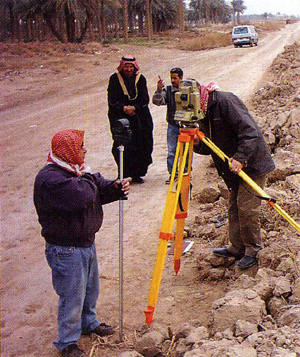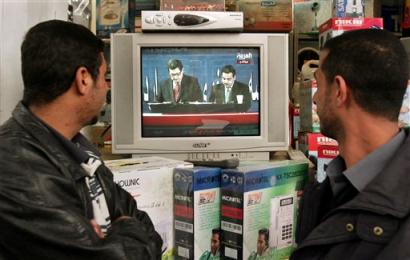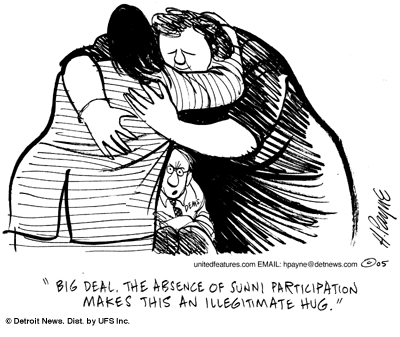
The ballots from Iraq's first constitutionally authoritative election are in. In Baghdad, Mohammed from Iraq the Model shares his thoughts.
Over at National Review, Andrew Stuttaford wonders if a good word for leftist blogger Matthew Yglesias risks "damaging his credibility" with the relativist monolith. Yglesias has disputed otherwise welcome news that Saudi Arabia, the quintessential infectiously rotting autocracy, recently held municipal elections. Because Islamists won handily, he describes the event as Riyadh's sleight of hand, giving reformers what they wanted in letter but not spirit.
Stuttaford ought to reserve his praise. Only those willing to help the Saudis wriggle out of liberalization will be duped by the "royal family" purporting to have answered popular demand. The point of Saudi Arabia's elections is, as I wrote to Jonah Goldberg ten days ago, that a repressive dictatorship responded to pressure. Not even a progressive-right interventionist would be surprised if, three months from now, dictator Abdullah snapped his fingers, rescinded the positions and carried on state business as if they'd never existed. Nor should anyone have been surprised that in a monophonic political conversation everybody speaks something akin to Wahhabi.
Stuttaford needn't worry about Yglesias, since Yglesias is actually adding to his leftist credentials; ten days ago he was criticizing the president over the lack of reform among America's 20th-Century allies. Now he's shrugging his shoulders and calling a reform meaningless. Enter the nasty double-game played by those suspicious of America, free will or both: Decry the lack of democracy in the absence of civil society and then dismiss what is encouraged in that vacuum by the act of voting, deriding the whole thing as a fool's errand.
The right's universalists know that foreign democratic candidates can't win in an environment utterly hostile to them — which is why democrats have won masterfully in Afghanistan and, as announced today, Iraq. The value of Saudi Arabia's elections is not who won but that they happened, which means Riyadh rightly fears Washington.
A stronger case for intervention, diplomatic or military, has been made.
ELECTIONS UNDER DESPOTS: When a ballot precedes the freedoms of assembly, expression and rule by consent, it must be gauged in terms of the existing regime's weakness and susceptibility to democratic overthrow — by way of referendum or revolution. Until the head of state can be chosen by a vote, a dictatorship's civil and political trajectories will tell us the most. The Abdullah sitting on Jordan's throne recently pledged to give regional governates a measure of autonomy; it is most certainly a decentralization of his power, however slight. The "Palestinian Authority" recently held an election, won by Yasser Arafat's favorite Mahmoud Abbas, but the frog intended to turn into a "Palestinian State" with enough ambassadorial kisses might as well be ruled by the mafia; there is no indication that the indoctrination of children or coercion of denizens to terrorist causes will abate.
We can be confident through the psychology of a strongman that both Jordan's governates and Abbas' election are gestures intended to please audiences, and would not be made if certain foreign audiences weren't watching. Neither event is satisfactory as an end. In Jordan, however, Jordanians themselves are part of the audience — and so one is hopeful that when Abdullah gives an inch, the people he has in thrall, like the people of South Korea and Taiwan did in the 1980s, take a mile. Washington's charge, if it must use diplomacy, is to continue forcing inches out of dictators.
The strength of Iraq's National Assembly vote was always understood to be in an Iraqi governments ability to close ranks and focus on saboteurs and invaders still active in the country, and not the election itself, but that hasn't stopped press agencies from monochromatic publications for everything terrorists have accomplished in the last thirty-six hours.
Fortunately, we know that the enemy can succeed only by disrupting and obstructing — and its record in the year after the crushing of Ba'athist and Khomeinist insurrections has been one of staggering failure. Reconstruction continues, and may accelerate. Iraqi armed forces are becoming more sophisticated by the week, the latest news of Iraqi Air Force pilots training to fly C-130 Hercules aircraft that the United States will no doubt soon donate. And as their ranks swell, Iraq security forces assume more and more responsibility. Jim Dunnigan reports that 12 of 18 provinces are under Iraqi control.
Dunnigan also points out the lasting impact American military training — exemplifying respect, duty and honor — is likely to achieve. (Another nail in the nail-riddled coffin of the argument for somehow having retained the Ba'athist army in April 2003 is the incredible difference in peformance between rank based on merit and duty to defend the weak, and rank based on blind loyalty and fear.) Equity can only solidify the integrity Iraqis have shown in spite of stumbles caused by their sordid history and difficult circumstances.
The power of that idea will inspire far beyond the military. Policemen are murdered waiting for pay, by an attack that wins elite media headlines? Their friends and relatives might be among the country's growing highway patrol, a force expected to be ten times its present size in eighteen months. The Near Eastern concept of "retribution," a cultural more not far removed from pre-Enlightenment Europe, is usually wielded by detractors as a wild card to support their theories of Iraq's inevitable democratic failure and lasting contempt for American liberators. One nose out of joint and the whole thing goes to hell, they say. But have these same backbenchers ever considered that earthy justice would be brought to gangs and terror cells? That Iraqis, unlike relativist Westerners, aren't asking "Why do they hate us?" of the terrorists but instead "How do we best beat the daylights out of them?"
Is there no life you know than a world of pure imagination? Compare the color I overlayed on a black-and-white photograph of Saturn to the true color image NASA just released, and you'll agree that beauty just can't be faked. My compliments to the artist, if you know what I mean.

I had just finished a brief conversation about technological advances in topographical surveying when I spied the latest print issue of McGraw-Hill's Engineering News Record, with cover headline "Tipping Point? With election success in Iraq, reconstruction contractors are encouraged but wary." Two stories are online, one reporting the current assessment of reconstruction efforts and the other examining wartime contracts. News is mixed but with far more good than otherwise.
The picture above, from the ENR cover, shows workers in Iraq using Total Station, a Global Positioning System-enhanced survey suite. At work I'm occasionally brought along for survey outings, and we use nothing less than Total Station. It's a poignant anecdote. Brought close to us by their January 30th entrance into the civilized world, Iraqis seem even a little closer.
Her United States Senate detractors accomplished little more than allying themselves with disgraceful hecklers and expanding the definition of "confirmation process" to include a public verification of their intellectual bankruptcy — and Secretary of State Condoleezza Rice hasn't given them a second thought during her confident, substantive maiden diplomatic tour. While talking Western Europe out of its tantrum, she's taken the remaining Axis of Evil nations with one hand each. On Iran, she teed for President Bush's drive. After warning Tehran that it will not waylay the United States as it had Europe, Rice condemned the terrorist capital for its theocratic oppression, telling Iranian democrats and the world that she doesn't believe "anybody thinks that the unelected mullahs who run that regime are a good thing for the Iranian people and for the region." Her adroit use of the threat of force — telling reporters that "the question is simply not on the agenda at this point" — was followed well by the president's message: "Don't develop a nuclear weapon."
As if to grab the spotlight, North Korea's Kim regime declared its nuclear arsenal this week, putting into simple words what has been obvious since the 2002 collapse of the Washington-Pyongyang "agreed framework" devised by former Presidents Clinton and Carter. Pyongyang's histrionics have grown old, however, especially in light of a concerted effort by the United States and its closest democratic allies to deprive Kim Jong Il room to parley or bully:
Asked to analyze the thinking in Pyongyang, Rice was almost dismissive."I'm not sure anyone ever gets very far by trying to second-guess the motivation of the North Korean regime," she said.
Thank you, and have a nice day. For the first time since 1990, a woman has dibs on "Iron Lady."
He came, he saw, he blogged; he's riding off into the sunset. Well met, Craig, and best wishes.
The president spoke and Iranians listened:
[O]n February 11th, following the Iran/Bahrain soccer match which will be held in Tehran, we invite every one of you brave compatriots to fill the streets of the country to demonstrate for the world at large, not only our [loathing] for these nefarious dictators but also our solidarity with the political prisoner, being held in the nightmarish prisons across Iran.The President of the United States, in his State of the Union address, applauded the Iranian people, saying: "And to the Iranian people, I say tonight: As you stand for your own liberty, America stands with you."
Fellow brave freedom-fighters,
Under these very delicate of circumstances, when the world's eyes are fixed on Iran, we Iranians must make sure that our voices echo throughout the globe.
Where do you stand?
In Washington we have print evidence of an attempt at nuance gone terribly awry. According to House Minority Leader, Democrat Nancy Pelosi, the White House's budget cuts too much because it doesn't cut enough:
[T]he President's budget cuts funding for first-responders and forces veterans to pay more for the health care they have earned. It is an American value to promote safe communities, but the President's budget slashes community policing initiatives. It is an American value to promote opportunity, but the President's budget eliminates 48 education initiatives and slashes funding for health care....It does nothing to address the record deficit of $427 billion.
Also in the offing are various theories that the problem is the president's Social Security proposal, which hasn't even been submitted to Congress; war expenditures that have not been a part of budgets since 2001, with little complaint; and the president's 2001 and 2003 tax cuts, which carry the distinction of having unshackled the economy and increased relative revenues since their enaction.
The Democratic Party, showing less consonance than a blindfolded, inebriated gorilla playing "Flight of the Bumblebee" with cherry popsicles on a xylophone facing backwards, while suspended from the ceiling of an operational wind tunnel.
You've got to hand it to Henry Payne.
Work demands time; I oblige. Expect my aforementioned article — on Iraq's electoral victory as the latest attestation to liberty's universality — tonight.


